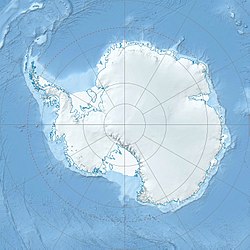Vostok station
|
Vostok Station Ста́нция Восто́к |
|
|---|---|
| Research Station | |

Lake Vostok composite image (NASA)
|
|
| Coordinates: 78°27′50″S 106°50′15″E / 78.46389°S 106.83750°ECoordinates: 78°27′50″S 106°50′15″E / 78.46389°S 106.83750°E | |
| Country |
|
| Government | |
| • Type | Polar Research Organisation |
| • Body | Russian Antarctic Programme |
| Elevation | 3,488 m (11,444 ft) |
| Time zone | AQ (UTC+06:00) |
Vostok Station (Russian: , translit. Stántsiya Vostók, pronounced [ˈstant͡sɨjə vɐˈstok], literally "Station East") is a Russian (formerly Soviet) research station in inland Princess Elizabeth Land, Antarctica. Founded by the Soviet Union in 1957, the station lies at the southern Pole of Cold, with the lowest reliably measured natural temperature on Earth of −89.2 °C (−128.6 °F; 184.0 K). Research includes ice core drilling and magnetometry. Vostok (Russian for "east") was named after Vostok, the lead ship of the First Russian Antarctic Expedition captained by Fabian von Bellingshausen (the second ship Mirny captained by Mikhail Lazarev became the namesake for Mirny Station).
Vostok Research Station is about 1,300 km (≈800 mi) from the Geographic South Pole, at the center of the East Antarctic Ice Sheet and within the Australian Antarctic Territory. As a signatory to the Antarctic Treaty System, Australia does not exercise sovereignty over the territory.
...
Wikipedia

